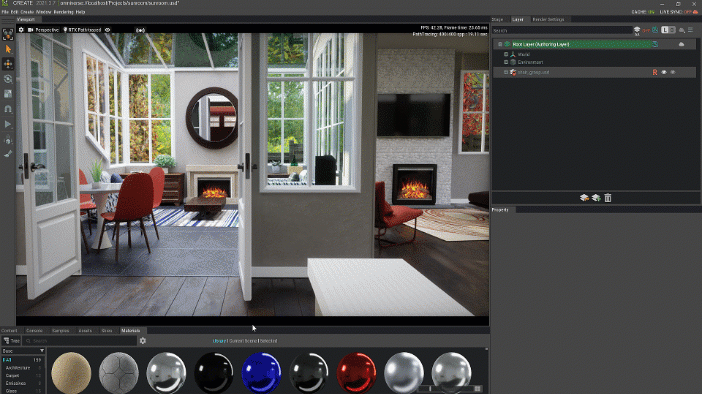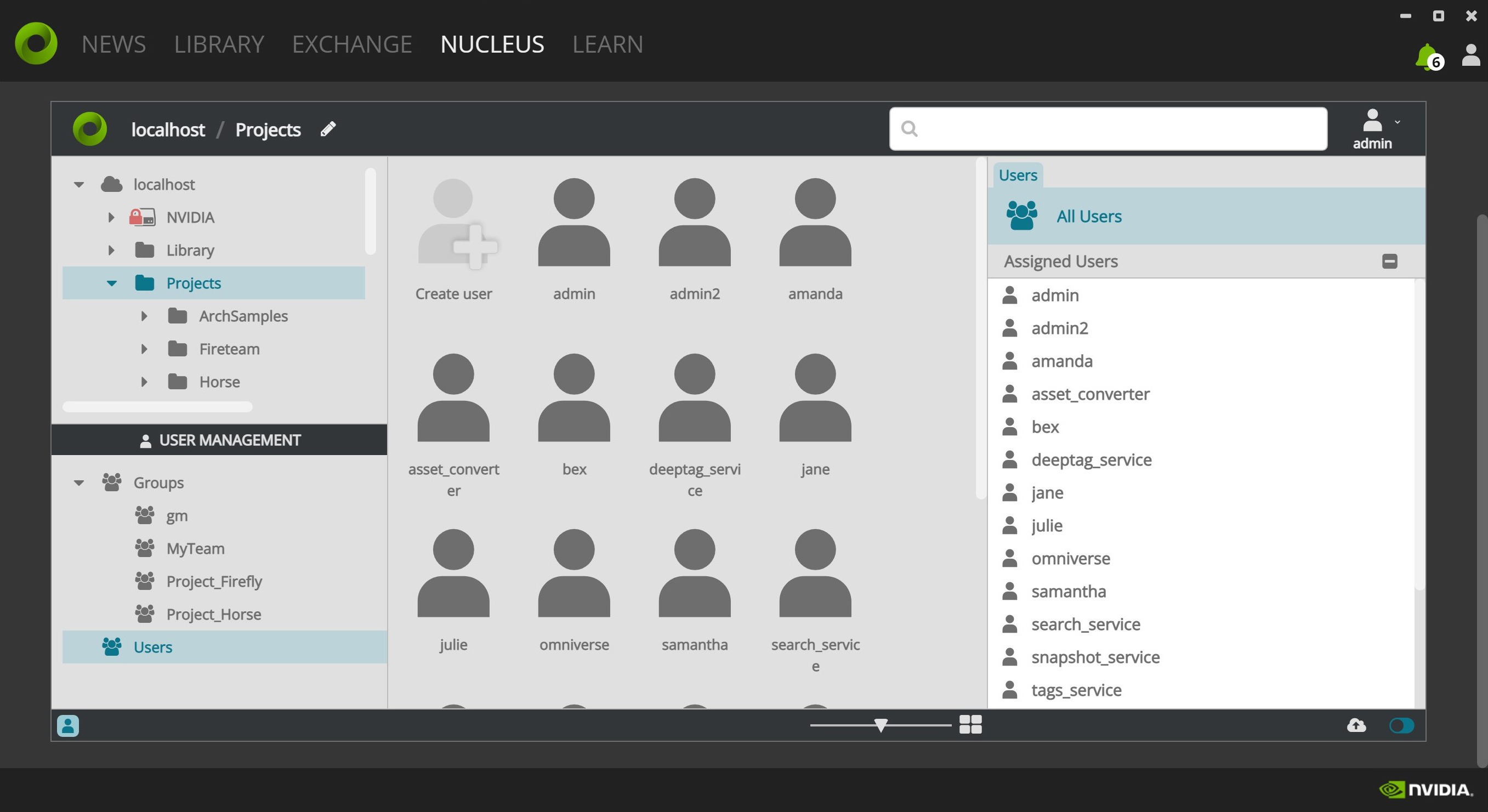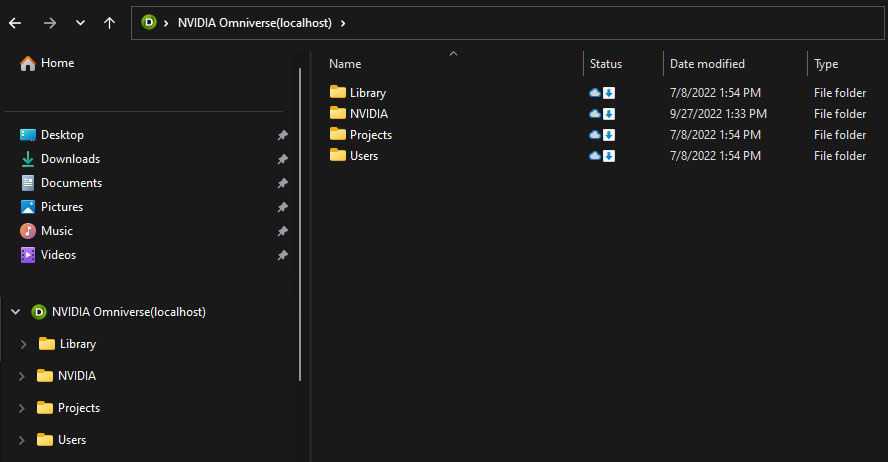Features and Benefits

Omniverse Nucleus is the database and collaboration engine of Omniverse. With Nucleus, teams can have multiple users connected together live with multiple applications all at once. This fosters users to use the application(s) they are the most comfortable and quickest with and allows for rapid iteration.
Nucleus offers a set of fundamental services that allow a variety of client applications, renderers, and microservices all to share and modify representations of virtual worlds together.
Nucleus operates under a publish/subscribe model. Subject to access controls, Omniverse clients can publish modifications to digital assets and virtual worlds to the Nucleus database or subscribe to their changes.
Nucleus can be installed in multiple ways to suit your needs: on an individual workstation, on-premises using an Enterprise Nucleus Server, or on your preferred Cloud Service Provider.

Collaboration and Live Sync between Applications (OmniLive)
When connected to Nucleus, scenes and worlds can be authored LIVE across multiple Omniverse applications, workstations, and users for advanced collaborative workflows.
Changes are transmitted in real-time between connected third-party applications. Digital assets can include (but not limited to) geometry, lighting, materials, textures, and other data that describe virtual worlds. Multiple clients (Apps, Connectors , and others) can be connected such that once one of those clients submits a change (publishes a change), every other client (subscriber) will immediately receive that change.
This allows artists to choose the right tool for the project and easily mix and match for their pipelines. Quickly being able to share ideas, swap between tools and see the results immediately is almost magical. Nucleus allows rapid iteration and keeps creators in the flow like never before.
Click here to learn more about OmniLive.
Version Control with Atomic Checkpoints
With checkpoints, files are automatically versioned for you, preserving your change history safely. This allows you to iterate and make several changes, keep them all, and decide later which version to use in your stages and scenes.
Additionally, checkpoints are created atomically when a file operation occurs (file save or copy, for example), meaning a checkpoint is created server-side for all users when a file is being modified simultaneously by multiple users.

The example above shows changing different checkpoints within Omniverse USD Composer to see how different chairs would look in the setting. Easily change from red to blue by simply choosing a different checkpoint. The team can continue iterating on the chair and this particular stage will always open the version you had selected, regardless of any future changes to the models.
Click here to learn more about Version Control with Checkpoints.
Licensing and Portability
Flexible licensing options allow for deployments of an Enterprise Nucleus Server along with additional services (including Farm and DeepSearch) on-prem within your office or datacenter using bare metal hardware or under virtualization (VMware & Hyper-V) as well as on your preferred CSP (Cloud Service Provider) through our BYOL (Bring your own License) model.

Users and Groups Management
Nucleus allows admins to easily add and invite users to their local Nucleus Workstation or Enterprise Nucleus Server. Additionally, an Enterprise Nucleus Server allows admins to connect scripts via API’s for greater control.

Click here to learn more about Users and Groups Management.
ACLs and Permissions Management
Nucleus allows restricting content access via its Permissions feature. Permissions are ACLs or Access Control Lists.
ACLs can be used to make a project directory be accessible only to the team working on it. ACLs make it simple for a user to protect their files from being changed by other users - but still be visible/readable. Similarly, the permissions on a directory can be set such that only a particular group of users can see them and even know that it exists. Admins can easily set the right level of permissions for the right users and groups.
Click here to learn more about ACLs and Permissions Management.
Authentication with SSO using SAML
Enterprise Nucleus Server supports single sign-on (SSO) authentication integration with SAML Identity Providers (IDPs).
Security Assertion Markup Language (SAML) is a standard for logging users into applications based on their sessions in another context. Using single sign-on (SSO) offers significant advantages over logging in using a username/password:
Users do not need to type in credentials
Users do not need to remember multiple passwords
Users do not need to renew forgotten passwords
As many organizations already have their users using an identity management system such as Microsoft Active Directory (w/ Azure AD), they can also use it to authenticate into an Enterprise Nucleus Server.
Click here to learn more about Authentication with SSO using SAML.
Secure Transport (SSL/TLS)
Enterprise Nucleus Server supports secure transport with SSL/TLS (Secure Sockets Layer). All interactions between the clients and Nucleus are via either WebSockets or HTTP and therefore, SSL/TLS can be used to secure the transport layer.
Omniverse applications support both SSL/TLS and non-SSL connections. They detect (and prefer) SSL/TLS automatically.
Click here to learn more about Secure Transport (SSL/TLS).
Caching
Omniverse Cache is a simple service that can be used both on users’ workstations as well as within infrastructure to optimize data transfers between Nucleus and its Clients.
Omniverse Cache speeds up your users by keeping the data close to them and avoiding the need to download files. This also reduces the burden on Nucleus and allows more users to work faster. Often, a lot of the content that users work on stays the same such as textures or background objects, so it can be extremely beneficial to have this all cached for quick access.
Additionally, Omniverse Caches can be chained together to allow for optimal performance for your clients.
Click here to learn more about Caching.
Omniverse Drive
Omniverse Drive makes browsing your content on a cloud server easy. Omniverse Drive shows a standard directory that allows browsing and utilizing content on Nucleus the same way users would regular files in Windows. Windows users can use Omniverse Drive to mount any number of Nucleus servers within the Windows file system. Any user that has used a cloud drive service, such as Microsoft OneDrive, Dropbox, or Google Drive, will feel comfortable.

Click here to learn more about Omniverse Drive.
DeepSearch
DeepSearch acts as your helpful smart AI librarian that knows exactly where all your content is at any time.
Artists, designers, and developers no longer need to individually tag their images and assets. Using the power of DeepSearch, they can quickly find files and assets they need for their project using simple words and phrases, both speeding up and adding increased efficiency into their workflow.
Instead of searching through folders upon folders of images, a user can simply search for red rusty barrel, small green tree, or black sportscar for example, and be presented with immediate results, all powered by AI.
Click here to learn more about DeepSearch.
Services and Developer Tools
Nucleus is highly extensible using the Omniverse platform. The Omniverse platform is built with modularity and performance in mind so users can create extensions, microservices or complete applications using Omniverse Kit.

Omniverse Kit is designed to be the premiere foundation for new Omniverse-connected tools and micro-services. It can be run headless to create a microservice, or with a UI. Nucleus leverages this and ships with several convenient microservices.
One example is thumbnail generation. Thumbnail microservices run in the background and generates thumbnails for any images saved into your Nucleus projects. The thumbnails are then used when browsing to make it easier to see what data you have stored.
Click here to learn more about Services and Developer Tools for developing applications using Kit and microservices.
Nucleus Tools and Backups
Once you have created your projects and data, you will want to back it up and ensure it’s safe. While included protections using checkpoints provide versioning, many IT Administrators require more robust backup processes. Sample scripts are provided as part of the Enterprise Nucleus Server for you to craft your own custom backup tooling to suit your requirements.

Supported Platforms
Nucleus is supported on both Windows (Workstation) & Linux (Workstation & Enterprise Nucleus Server). To help choose the best offering, please review the Nucleus Sizing Guide for more information.
